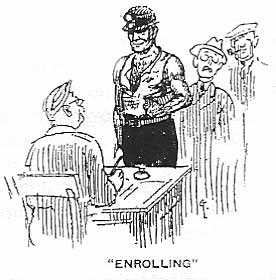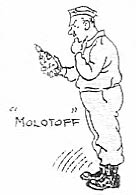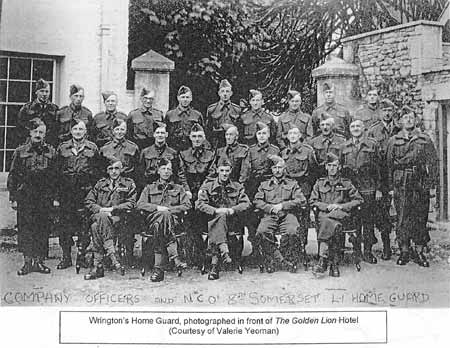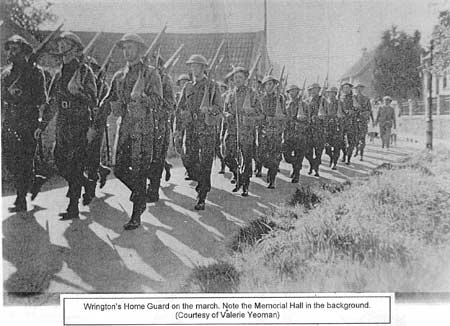 |
Wrington at War 1939-45 by Mark Bullen |
 |
Wrington at War 1939-45 by Mark Bullen |
| The Home Guard Thanks to the wonderful BBC television series Dad’s Army, practically everyone knows about the Home Guard, or the Local Defence Volunteers as they were originally known. The Somerset Countryman ran the following article in January 1941. “ As good an approach to the subject as any, perhaps, may be made by reference to the spirit of our Volunteers, as evidenced within one’s own experience. When asked to organize urgently a Home Guard formation to cover a large district, I was frankly none too optimistic. For the area in question contains but one small town and a few large villages, the rest of the population being sparsely scattered between isolated hamlets and farmsteads. Many of the old soldiers had re-joined, many others of the available manpower were already serving with the Special Constabulary, A.R.P., and so on. Furthermore, many were tied for long hours by their work on the land, while a large number, come to manhood since the end of the last war, had no military experience of any sort. Such were my thoughts as I went to address a hurriedly-summoned meeting, expecting to find but a handful of an audience. |
|||||||||||
 |
|||||||||||
| But the hall was so packed that men were standing. So, in better heart, one explained things and put the urgency of the situation to them. It was put without gloss, the bare facts – and the bare risks to which those might be liable for whom there was as yet no weapon, no enrolment form, no official armlet to justify the bearing of arms by one in civilian clothing. For that very night, twenty-five men were called upon to volunteer for duties until dawn. There were seventy-three present and every man gave in his name. There have been difficulties and disappointments, of course, yet an immense degree of patience has been shown and, where there has been impatient talk, it has been almost entirely “on the right side” as one might say. By this I mean, impatience because everybody couldn’t be armed and uniformed immediately. |
|||||||||||
|
Although by the terms of his engagement a man may leave on a fortnight’s notice, yet in spite of the gradual militarization (to a degree) of a body which he originally joined principally for observation and patrol duties; of hours of night duty often added to the long day of civil employment; of other weekday evenings given up to military classes; of Sundays mornings or afternoons devoted to musketry and other training; of the dark and wet route in winter to the assembly at the village hall; the numbers have been astoundingly maintained. Were one at liberty to reveal the strength of the Home Guard in Somerset, the numbers would, I think, give the reader a pleasant surprise and thrill in the heart – and (perhaps broadcast in counterstroke to Haw-Haw) Adolf a nasty shock and pain in the neck!
Or, as one man succinctly put it, “As I see it, our only excuse for existence is to look out for Germans and to help the military to kill them or, better still, kill them ourselves.” |
|||||||||||
| One of our jobs was guarding Perry Bridge [on the A38]. We were on duty there one night with Ted Croucher (Lawrence’s father) as we had chummed up as mates. This night I said “There’s some rustling out there, Ted, out in that field” and he said “Yes, there is something. Put one up the spout. I’ll go down to the gate at the bottom and go in.” I said, “No, let’s call the rest of the Guard out.” Anyway off Ted went – quite brave to do it really. He came back a little while later and told me it was a cow walking down through the leaves to drink out of the river! |
|||||||||||
 |
|||||||||||
| The bridge was on the main thoroughfare for troops and at one time the American troops came through the village. Lardy Millard was another bit of a one and we never slept because he was always telling us jokes. Having to go and do a ten or eleven-hour shift on the farm the next day wasn’t funny. This particular night he went out into the road and saw this car coming along. So he stood in the middle of the road and shouted “Halt, who goes there?” “Only me, Millard, only me Millard.” He said, “Let me have the password.” And it turned out to be Doctor Bell, doing his inspection He was Lieutenant then. He swung the door open and the bayonet hit the door. Of course, he should have given the password. Just over the other side from the bridge there was a gateway and we had a portable caravan there. We were there when they were practising taking the gliders over. The Green Howards did manoeuvres in the village as well as part of their training. I remember up by the Rectory there used to be gravel and they threw one of these thunder flashes and they had to get the doctor and take one of the blokes to hospital, grazed all up the arms and legs. We used to have a duty about once a week and went on from about 10 at night ‘til 6 in the morning, then have quick bit of breakfast. There was not even time for a shave and then straight in milking by 7 o’clock, then not home again until 6 at night.” We did proper drills with rifles, shooting with 303’s, Winchesters and Remingtons. We did some shooting in one of the fields up by the White Hart, with live ammo. Up in the old quarry we used a sten-gun - that was an experience. There was another character in the village called Tom Wilkins who worked around, doing thatching, anything. One day we had to go down the old railway lines and across the fields; we were supposed to be taking on part of ours and part of Congresbury platoon and were supposed to attack them. So we went along and were expecting somebody to give a signal to say we were coming. We won and when we came back someone asked where Tom Wilkins was. We got a bit further along and Tom suddenly appeared from the blackberry bushes. There was a hole in there and he came out and said “I were comfortable there. I thought I’d let thee get on and win.” I asked him what he was holding and it turned out to be his cider bottle that he’d managed to secrete in his pocket! |
|||||||||||
 |
|||||||||||
 |
|||||||||||